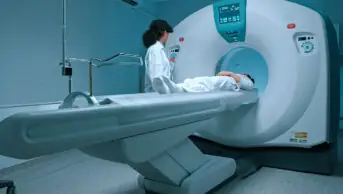
Jacob Lund / Alamy Stock Photo
Forty community pharmacies in England will begin directly referring patients with possible signs of cancer for scans, as part of a pilot service from January 2023, The Pharmaceutical Journal has learned.
The pilot was first announced by NHS England in June 2022, with pharmacists expected to spot signs of cancer — such as a cough that lasts for three weeks or more, difficulty swallowing or blood in a patient’s urine — and refer patients for scans and checks without needing to see a GP first.
In response to a freedom of information request, NHS England told The Pharmaceutical Journal on 13 December 2022 that four cancer alliances are currently selecting 20 community pharmacies each to take part in the pilot.
These alliances are Greater Manchester Cancer Alliance, Kent and Medway Cancer Alliance, Thames Valley Cancer Alliance, and Peninsula Cancer Alliance — which covers patients across Devon, Cornwall, and the Isles of Scilly.
“The plan is for phase one of the pilot to go live in January 2023 in 40 community pharmacies across two of the alliances, with the remaining two alliances being staggered to March/April 2023,” NHS England said in its response.
Across the country, there are 21 cancer alliances, which bring together health and social care organisations to coordinate cancer care and aim to improve outcomes for patients.
The pilot comes after the Department of Health and Social Care (DHSC) said in its response to the Health and Social Care Select Committee’s review of cancer services on 7 June 2022, that “pharmacies are well placed to spot people presenting with ‘red flag’ potential cancer symptoms during a healthy lifestyle intervention, when they come to buy medicine or pick up a prescription, or when they visit a pharmacy seeking advice”.
Gareth Jones, director of corporate affairs at the National Pharmacy Association, said the pilot “is a great opportunity to further expand the clinical role of pharmacy teams, increase early detection rates by spotting red flag symptoms and improve outcomes for patients”.
“This initiative builds on the skills of a highly trained pharmacist workforce and the fact that pharmacy staff know their patients well and see them regularly,” he said.
“While the sector desperately needs emergency funding to keep the doors open, that shouldn’t stand in the way of the pharmacy network exploring new services. With appropriate funding, pilots like these could expand the pharmacy offering in the years to come.”
Michelle Mitchell, chief executive of Cancer Research UK, said: “We’re pleased to see investment in innovative models of care, such as referrals from community pharmacy teams.
“By changing the way people engage with the health service, we have the potential to help diagnose more cancers at an earlier, more treatable stage. We look forward to seeing how these efforts will support the NHS’s ambitious early diagnosis targets.”
In the ‘NHS long term plan‘, published in January 2019, the NHS committed to “dramatically improving cancer survival, partly by increasing the proportion of cancers diagnosed early, from a half to three quarters” by 2028.
To meet this goal, the government set up 92 community diagnostic centres, which patients can be referred to, to have their symptoms checked for a range of conditions, such as cancer, and heart and lung disease.


